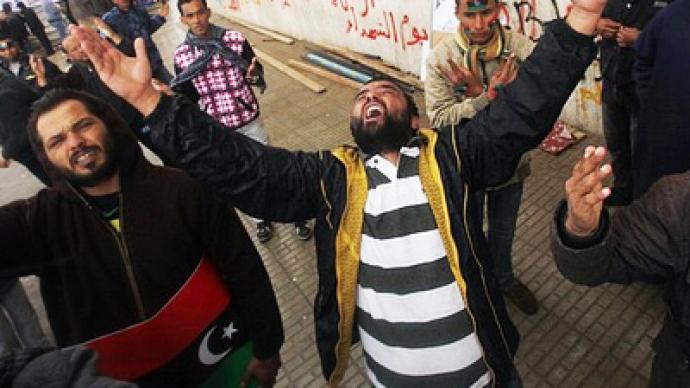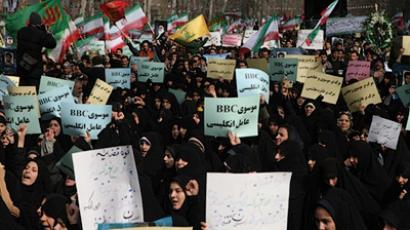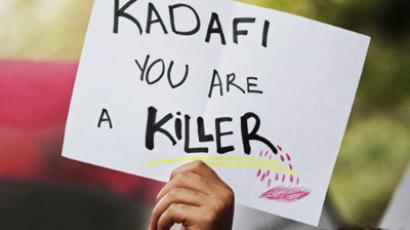West must allow self-determination for Libya - Putin

Russian Prime Minister Vladimir Putin has warned Western countries against attempts of meddling in the Arab world to try to impose democracy.
Speaking after talks with the EU leadership, he said that previous efforts along those lines had led to victories for governments the West is now fighting to contain.“Today, we say we're concerned about things happening in Libya. But the North African cell of Al-Qaeda is also concerned about what is happening in Libya. Do you think this is a coincidence?” the Russian PM asked.“I would like to go back in history a little bit. The former leader of the Iranian revolution – where did he live?! He lived in Paris and as a whole he was supported by the Western community. Now the entire Western community fights against the Iranian nuclear program,” Putin pointed out.“I remember just recently our partners were very active in supporting democratic elections in the Palestinian autonomy. And Hamas won. And immediately they declared Hamas a terrorist organization and started fighting against it. We need to give people a chance to determine their future themselves. We need to give them an opportunity to take a natural way without any foreign interference to build their future,” he concluded.
Gaddafi blames Al-Qaeda and drugs
Meanwhile, Libya’s leader Colonel Muammar Gaddafi is desperately clinging to power, despite facing more defections from his own rule.He is battling to shore up control of the capital Tripoli and western areas, with protesters consolidating gains in the east of the country.Tripoli remains heavily guarded by pro-Gaddafi forces, with tanks deployed around the city. The leader has called on thousands of mercenaries to defend his bastion, as he is faced with more defections from his own regime.In a speech on state television on Thursday, Colonel Gaddafi said that he believes Al-Qaeda's Osama bin Laden is behind the violent uprisings in Libya. Speaking by phone from an unspecified location, the leader described the anti-government protesters as young people who were being manipulated and possibly were acting under the influence of drugs.The overall death toll has been difficult to determine. Conflicting reports put the number between 300 and 2,000.Many foreigners caught up in the trouble are attempting to flee. Russia has flown most of its citizens out with the remainder being taken to Turkey by ferry.
John Graham, former US diplomat at the US embassy in Libya, recalled how Gaddafi started his career. “I was in Libya when Gaddafi took power. He came to power as a 27-year-old naming himself a savior of Libya. In many ways, he was,” Graham told RT. “Now that he is 69, he sees himself as a father of this country. Now his “children,” the people of Libya, are disrespecting him and disobeying him. He is furious with them. He is lashing out, and that’s what we see.”Graham told RT that the main reason why Libyan unrest is so different from the situations in Tunisia and Egypt is the country’s military. “Gaddafi has made sure that the Libyan army is not powerful, not a resource of stability. It is middle class; there are poorly educated people, unlike in Egypt where the army is very strong civil class. That’s why Libya sank in chaos, unlike Tunisia and Egypt. If a civil war starts, this will lead to complete disintegration of the country.”
The international community should not underestimate Gaddafi amid enthusiasm about possible victory of the opposition forces in Libya, believes journalist Ian Birrell, former deputy editor of The Independent.“I think he will do whatever he can to remain in power. I think we’re seeing that with this talk about more firing on people in Tripoli. We’ve seen machine guns, we’ve seen anti-aircraft weaponry used on people. This is a man who has shown himself to be utterly ruthless, and that’s why he stayed in power for more than 41 years,” he said.
A political expert from the Moscow-based Institute of World Economy and International Relations, Igor Khokhlov, points out that the influence of Al-Qaeda and jihadist networks all over the Muslim world should not be underestimated.“Now when we have revolutions rolling over the Arab world, one country after another, some of those countries are pretty rich in mineral resources, oil and gas and of course have cash – [they] are a top [target] for Al-Qaeda and other jihadists,” he said “These recourses can easily be used by terrorists to stage [attacks of an] unprecedented scale.”Khokhlov believes that the Western countries and the United States do not understand some vital things about the Arab world.“They still think in terms of colonial times,” he said “They vastly underestimate their influence over the internal situation. One has to understand that nationalism is the major driving force across the region. When people see the attempts of the West to push [towards] them it could easily radicalize the situation and this chain of revolutions will never end.”
Arab world “reshuffling furniture in the same house” – expert’s opinion
With Libya following the revolutionary path of Tunisia and Egypt, some experts believe the outcome of the revolt there will be different.Dr. Orit Gal an expert in international relations says it is really hard to determine whether the ongoing crisis in the Arab world is actually democratization.“What we have really seen so far is regime collapse rather than regime creation, so we don’t really know how to characterize it. Whether it is a wave of democratization or we are going to see a wave of Islamic governments rising up across the region,” she said. “Or the worst-case scenario, whether we are going to see a wave of failing states in which you will have regime collapse, with difficulties in creating new and stable governments.”
Anthony Wile, founder and chief editor of political website thedailybell.com, does not share enthusiasm about the chain of revolutions in the Middle East, saying the major problem – corruption – will probably stay, and on the whole the situation will not be to the benefit of the people of the Middle East, “who are engaged in a revolution that doesn’t have a great deal of real substance underneath of it.”“What we’re seeing here today in the Middle East, is probably not so much as an actual change in a positive direction that would bring any benefits to the people, but more of the same – I would suggest – reshuffling furniture in the same house,” he explained.
EU and US drowning in the Middle East turmoil
The EU is considering sanctions against Libya due to its leader’s bloody crackdown, while the Swiss government has already ordered a freeze of any locally held assets belonging to Gaddafi.
International relations expert Mark Almond believes there is a big dilemma for the West regarding North African and Middle Eastern unrest, as on the one hand they want democracy to be established there, but on the other, they also want a state that will be friendly to the Western powers. “But almost certainly, Arab democracy is going to be a great deal less comfortable for the West than Arab dictators, Arab autocrats, Arab monarchs have been,” said Almond.
Ahmed Badawi, co-founder and co-executive director of the Berlin based think-tank Transform, believes a large part of the unrest in the Arab world, which took everybody by surprise, is an outcome of the Western policy that kept supporting Arab dictators and failed to correctly understand the mood of the people.“While the leaders were continuously losing their legitimacy, there was this faulty assumption that we [the West] can rely on leaders like Mubarak, Ben Ali and even Gaddafi, in the last few years, by giving weapons and arming these leaders to the teeth, thinking that they will be able to control their populations. Of course, that proved to be a very faulty assumption, indeed, on behalf of many people in the West,” said Badawi.
The current situation with the rising oil prices may not lead to another economic crisis, but will definitely become a challenge for many countries, making economic recovery more difficult for them, says Dr. Manouchehr Takin, Senior Petroleum Upstream Analyst at the Centre for Global Energy Studies in London.“Even the United States – it is importing about ten million barrels per day, and when the prices go up by a few dollars a barrel, it’s a huge quantity, and the United States has already a major account deficit, and this will be on top of that. Look at India and China, which are net importers, and the African countries…It will be having effect on those countries definitely,” said Dr. Takin.
Robert Naiman, a contributor to the Huffington Post and the policy director of the Just Foreign Policy group, does not expect the UN to intervene in Libya. This kind of decision will not be authorized by the UN Security Council as the whole situation in Libya is under the very close scrutiny of the entire international community, and such a move could provoke multilateral intervention.Naiman says it is important ‘not to get in front of the people moving forward’.“I don’t agree whatsoever that the word democracy, or more importantly, the underlying idea – the democratic aspirations of the majority of people in the given country – that that is somehow Western or US copyrighter pattern done,” – says Naiman. “The events of the last few months should have put paint to that notion. These are indigenous events, reflecting the sentiments and problems and values of people there.” But this does not mean that the worldwide community cannot be involved, at any rate. Humanitarian aid, for instance, could always be provided. Whatever assistance might be granted to the region, it should be in line with international law, concludes Naiman.














